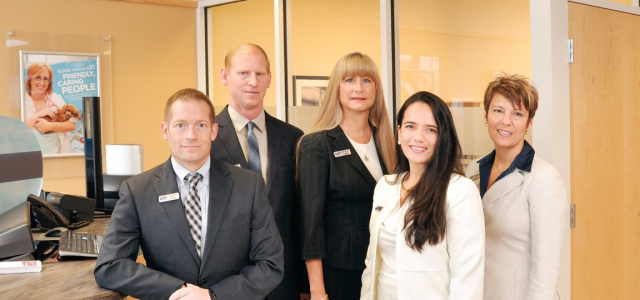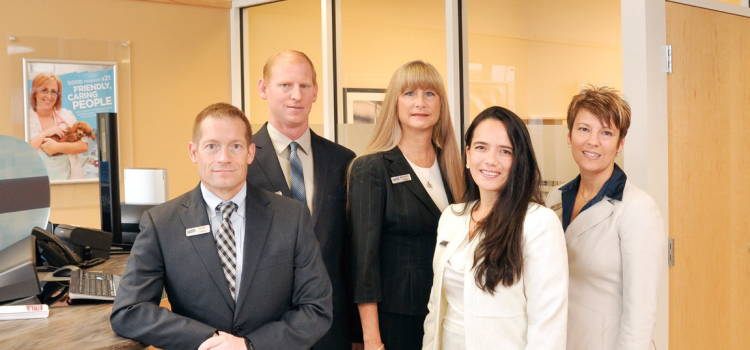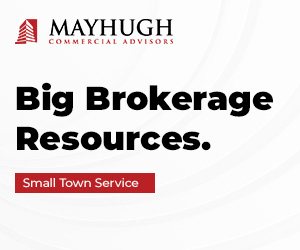


Like many who purchased real estate at the height of Southwest Florida’s real estate boom, Dr. Christopher Paladino was eager to refinance the mortgage on a property that had dropped in value since he took out the loan in 2006. “I went to several of the large banks that all promised me they could refinance it,” says Paladino of his Bonita Springs medical office space. “But after about three years of getting the runaround, I’d pretty much given up.”
Things changed when a banker (with the bank that had written Paladino’s original mortgage) mentioned Achieva Credit Union and introduced Paladino to Janis Vargas, commercial lender and SBA loan specialist for Achieva. He knew little about Achieva, which is better known in the Tampa/St. Pete area where it was founded in 1937. It expanded to Southwest Florida in 2013 and, with just three Lee County locations, is still establishing a presence in the market.
Despite his doubts that a credit union would come through for him when his own bank had turned him down, Paladino was pleasantly surprised. “Not only were they able to do something that we didn’t think was possible, they gave me a great rate,” says Paladino. In addition to cutting his mortgage interest rate by more than half, “they really addressed all my business needs,” providing his medical practice with a business line of credit and a checking account.
Best of all, he wasn’t required to move all of his banking business to Achieva as a condition of the loan; something other lenders had pressured him to do. Instead, he pays his mortgage from an account at his other bank and sends it via smartphone to Achieva, where it is deposited into his checking account for automatic payment on his loan.
“It’s really convenient,” says Paladino. He adds that he’s grateful to his bank for not refinancing him and for “pointing me in the right direction.”
To others, Achieva is not so much a lender of last resort, but an alternative source of capital, particularly for commercial customers who want to expand their business. Real estate investor Christopher Lally, president and CEO of Parker House Properties in Cape Coral, is one such client. Over the last five years, he and various investment partners have acquired approximately 325 residential rental units throughout the Cape, Fort Myers and North Fort Myers. There are never more than a handful of vacancies.
“We’ve been very successful,” says Lally, who is always looking for opportunities to expand Parker House’s property portfolio. To finance his acquisitions, Lally works with various lenders, including large, national banks. However, due to federal limitations on how much money a bank can lend, some investors are obtaining financing through credit unions, which don’t have the same restrictions. A business associate urged him to contact Achieva and, through LinkedIn, Lally introduced himself to Vargas.
“Janis was extremely personable and eager to understand our needs,” says Lally. “I hadn’t worked with Achieva before, but they’ve been great. They seem to have a little more leeway than some of the traditional banks and they’re much quicker about approving loans.”
It took just 90 days for Parker House Properties to close on its first multi-million dollar loan with Achieva; it recently closed on another. Lally predicts there will be more to come, thanks in part to Achieva’s “more than favorable” rates, efficient operations and ability to make sizeable loans.
“Everyone at Achieva has been so pleasant to work with. I feel like a valued customer, not an inconvenience,” says Lally. “On a one-to-10 scale, I’d give them a 10 out of 10.”
According to Vargas, Achieva’s borrower-friendly philosophy gives it an edge over its larger competitors, particularly with business lending. “We consider ourselves to be partners with community business owners. We want them to succeed, so when a loan is doable, we look at what we can do to help them,” she says. “But if they don’t qualify for a loan, we identify what they need to do to put the business in a better position (for possible future financing).
Appealing Advantages
Although credit unions are immensely popular in certain markets, they’re largely misunderstood by the banking public. Typically, they’re perceived as having limited lending abilities and services simply because they have fewer locations than most traditional banks. As a consequence, credit unions tend to have a comparatively smaller market presence. There’s also the lingering belief that credit union membership is exclusive to specific groups, such as schoolteachers, postal workers and government employees, and the idea that they cater primarily to residential consumers, not businesses.
“There are a lot of misperceptions about credit unions,” admits Scott Mc- Kim, senior vice president and chief lending officer for Achieva. “Business people who are used to working with large, national banks often assume that we only make small consumer loans.”
That’s not the case at Achieva, which offers comprehensive banking services and has the ability to make business loans up to $15 million. Established as a credit union for Pinellas County teachers 78 years ago, Achieva has evolved and grown with the times, outperforming and outlasting many of its competitors in the process.
Currently, it boasts $1.2 billion in assets and more than 100,000 members in 18 Gulf Coast locations. In addition to long-standing branches in Pinellas, Pasco, Hernando, Manatee, Sarasota and Hillsborough counties, Achieva now has three locations serving the residents of Charlotte, Lee and Collier counties. It opened two Cape Coral offices in 2013 and in September, added an Estero location.
Despite its recent expansion, Achieva remains something of an enigma in Southwest Florida. To clear up some of the misconceptions about credit unions, Vargas and McKim recently answered the questions they’re most often asked about Achieva. In the following Q&A, they discuss how it operates, what distinguishes it from other lenders and how Achieva helps local residents and business owners succeed.
Who qualifies for membership?
McKim: Although many credit unions got started with fairly specific membership requirements, Achieva Credit Union is open to anyone living in the counties in which we operate. It costs $1 to join. However, non-residents may also establish membership if they have a compelling relationship that can be developed with a credit union. If so, they pay $1 to the Achieva Foundation, which exists as its own fundraising entity. While it is a vehicle for credit union membership, it also supports programs that Achieva focuses on, and enables us to reach beyond our market boundaries to give back to the communities that we serve.
How does Achieva operate?
McKim: We distribute our profits through the dividends we pay to our depositors. Once you become a member, you can vote and have a voice in how you earn those dividends.
Vargas: On the commercial real estate side, we typically have better terms and lower rates on loans than most commercial banks. For example, many banks will do three- to five-year term loans or balloons, costing borrowers thousands of dollars on additional closing costs. On the other hand, Achieva, depending on the member and the circumstances, will do terms from five to 15 years with interest rates that are more borrower-friendly. We see our members as our partners and want them to do well.
How do you differ from banks?
McKim: I think our approach to lending also differentiates Achieva from most traditional banks. We’re here to help people in the good times as well as the bad. Also, as a $1.2 billion company, we’re able to compete with all the large banks and we’re bigger than many local banks. But one of the fundamental differences is that all of our decisions, all of our underwriting and all of our servicing are done locally. Unlike the large banks, we don’t send it off to an office in another state. It’s all done here.
Vargas: That also allows us to make decisions quickly. Our organization is very lean, very efficient. In processing loans of less than $500,000, there are no more than three people involved, including the borrower.
Another major difference is our internal structure. Most banks have a highlypaid board of directors whose primary goal is to maximize the return on investment to stockholders. We are a not-for-profit organization whose board is composed of unpaid volunteers wanting to do what is best for the communities we serve. Our directors are elected by the credit union members; it’s a very transparent process.
As one of our directors remarked last year, we are not in the business of kicking people out of their homes; we are in the business of keeping them in. That doesn’t mean we’re going to make bad decisions or provide preferential treatment to our members. However, we think of our members as people, not numbers. And we want to work with them. That’s a very different approach compared to most national lenders.
What other benefits do you offer members?
Vargas: We have a lot to offer borrowers, including the services and lending capacity of larger competitors, but at better rates and terms. Also, because all of our commercial and SBA loans are portfolio, we can be more flexible than some of the banks that sell their SBA loans to the secondary market.
Further, we currently offer a program that will finance upside-down commercial properties at no out-ofpocket cost to the borrower, provided the properties are at least 51% owner occupied. Most banks won’t do that, but those that do typically charge much higher rates and require a much larger down payment to maintain their loanto- value ratios at less than 80%-85%.
It’s also important to note that we are insured by the NCUA (National Credit Union Association) — the credit union equivalent of the FDIC — and so our members’ deposits are safe.
How are loan decisions made?
McKim: Most decisions are made on the local level. We have a committee process for larger loans that ultimately may require approval from our board of directors. But again, since everything is local, it’s something we can do very quickly by assembling the appropriate people to approve it.
Obviously, Achieva has successfully navigated many economic cycles over the years. How has it avoided becoming a casualty of the major downturns?
McKim: Our loan portfolios are extremely diversified. Therefore, if one or more specific segments were to underperform, we can look to some of the other areas where we lend money for the support and coverage to compensate. Also, because we’re not trying to chase a particular profit target to pay dividends back to shareholders, we don’t feel pressured to lend in areas that may be inadvisable.
We try to be very specific in the areas where we lend money and we thoroughly evaluate the borrower’s ability to repay the loan. That doesn’t mean we’re only looking for the most credit-worthy borrowers; that is definitely not the case. We’re looking for potential business partners — small and medium-sized business owners who could benefit from having an Achieva membership and by growing their business. We want to help them get to the next level of what it is they want to do.
In Southwest Florida, who are your current and target customers?
Vargas: So far, our customers include independent business owners who are buying their location, commercial real estate investors looking for more favorable loan rates and terms, and entrepreneurs who are either buying a franchise or starting their own business. We also help people manage and improve their cash flow through loan consolidation. In fact, we’ve had great success turning around deals for borrowers that other banks turned down due to cash flow or credit problems. We think outside the box.
In addition to business loans and commercial real estate loans, Achieva offers equipment loans and lines of credit. We’re here to support local businesses and be partners in their growth.
What do you look for in a borrower?
McKim: We look at the full story, not just a credit score. Anyone who has a well thought-out business plan and has demonstrated that they are capable of running that business is the kind of borrower Achieva will consider for a loan. Small businesses are really the engine behind the economy and that’s where we’re really lending a lot of our money today.
For example, let’s say you want to open a cupcake shop. If you’ve never made a cupcake before in your life and suddenly decide that’s what you want to do, we’d probably have a bit more conversation than we would with somebody who’s been making cupcakes for years, has a passion for it and wants to commercialize what they do. That’s probably a great partner for Achieva.
How do you choose your locations?
Vargas: We don’t build branches from the ground up and wait to see whether or not we succeed. That is expensive and not the best use of money. We’re focused on long-term growth and we want to be near the population centers with a wide range of incomes, not just the high-end. That’s why we usually open branches in retail strip centers, particularly when we’re getting established in a new market. Once our membership grows to a certain level, we’ll look at investing in larger, freestanding real estate.
What’s next for Achieva?
McKim: Barring some unexpected development in the economy, we don’t foresee changing our lending practices or possibly curtailing our appetite for credit. The economy is improving slowly and we don’t want to see that go away. But we also want to be available to provide the resources to those who need it, and that means being open to whatever is coming down the road. In Southwest Florida, we intend to continue growing. We owe it to our customers first and foremost in the Lee County area, but we are starting to draw more customers from Collier and Charlotte counties, so we expect to have branches in those markets before long.
Achieva’s Key Leaders
Scott McKim, Sr. V.P. & Chief Lending Officer
In addition to managing Achieva’s team of loan officers and specialists, McKim is responsible for developing the company’s lending products and services.
Prior to affiliating with Achieva in 2014, McKim spent more than 20 years in the financial services industry, during which time he held a number of top executive positions at major national banks. He got his professional start at Bank One with positions in lending, credit cards and finance. Subsequently, McKim served as associate vice president and lending product manager for Nationwide Bank, as well as chief financial officer and product manager for Huntington Bank and Huntington Auto Finance.
McKim earned an MBA from Fisher College of Business at The Ohio State University and a BBA in accounting from Bowling Green University.
Janis Vargas, Commercial and SBA Lender/Collier, Lee and Charlotte Counties
Vargas joined Achieva in 2013, when the company expanded into Southwest Florida. She handles business and commercial loans ranging from $250,000 up to $15 million.
Besides her 10+ years of experience in business and SBA lending, Vargas has more than 15 years in the financial industry, both in her native country of Colombia and in the United States.
She graduated from Universidad Externado de Colombia where she earned a master’s degree in marketing and a Bachelor of Business Administration in finance, with a minor in marketing.
Machelle Shirk, Business Banker/Southwest Florida
Shirk grew up in a banking family and is passionate about serving small business owners. At Achieva, she handles loans up to $250,000 and focuses on cultivating comprehensive business relationships while providing products that offer banking solutions to businesses and their employees.
Shirk’s financial services background spans more than 30 years in Lee and Collier counties, and includes experience in compliance, BSA, security, operations, sales coaching, strategic planning and retail management. She is involved in many community organizations such as the Cape Coral Downtown Redevelopment Board, the Cape Coral Chamber of Commerce, Kiwanis and St. Matthew’s House in Collier County.








